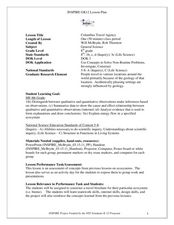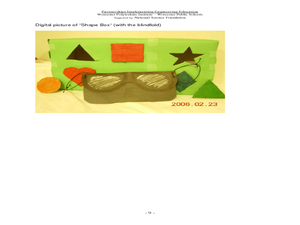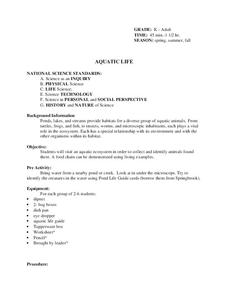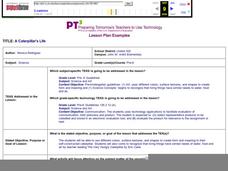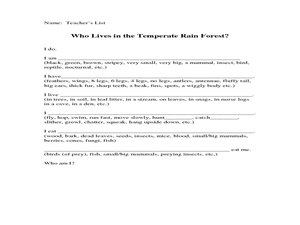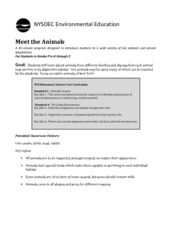Curated OER
Columbus Travel Agency
Eighth graders research about their chosen ecosystem. In this life science lesson, 8th graders play the role of travel agents and create a travel brochure. They share this in class.
Curated OER
PLANT LIFE CYCLES
Student learns about the life cycle of plants by watching a time-lapse video. This activity provides students with further evidence that all living things grow and change as they progress through their life cycle. Student conducts a...
Curated OER
Recognizing the Importance of Sight
Students discover the true value of their senses. In this sight lesson, students discover the difficulty of life without sight by performing everyday activities without the help of their eyes. The students examine their results and the...
Rural Science Education Program
Bees and Flowers – Partners in Pollination
Why are bees so important? After several activities where kids investigate the form and function of flowers, they learn about the different types of bees and label them. They then examine pollen under a microscope and decide which bees...
Polar Trec
Animal Monitoring Introduction
Not only do mealworms taste great, they are also great for classroom science lessons. In pairs, young scientists observe and record what they see as they check out what their mealworms are doing from minute to minute. Each minute...
Curated OER
Vegetable Twister
Second graders study the changes in organisms over time. In this Life Science lesson, 2nd graders explore how living things react to changes in the environment. Students identify the basic needs of living things.
Curated OER
Living in a Watershed
Fourth graders examine watersheds. In this ecosystem lesson, 4th graders discover what a watershed is and identify the local watershed they live in. Students investigate the attributes of a watershed as well.
Curated OER
What Lives In A Shell?
Second graders study the readily observable characteristics of marine invertebrates, 2nd graders research the invertebrates and complete worksheets in this series of lessons.
Curated OER
Aquatic Life
Pupils explore aquatic life. In this science lesson, students visit an aquatic ecosystem and collect animals found there. Pupils create a food chain for the aquatic ecosystem.
Curated OER
A Caterpillar's Life
Students use different colors, surface textures, and shapes to create form and meaning to their caterpillar. They also come to recognize that living things have similar needs of water, food and air by teacher reading The Very Hungry...
Curated OER
School Forest
Sixth graders explore the concept of biodiversity. In this biodiversity instructional activity, 6th graders discover a variety of planets and animals that live in forests, and how a rotting log benefits that environment. ...
Curated OER
Changing Planet: Fading Corals
Show the six-minute video, "Changing Planet: Fading Corals," and then demonstrate how calcium carbonate forms a precipitate in the presence of carbon dioxide. Separate your scientists into small groups to gather information about coral...
Curated OER
RAINFOREST Mini-Unit
Students engage in a variety of activities to investigate the subject of rainforests. The lesson plan focuses on the different floors of the rainforest and the types of life that exists on each.
Curated OER
PLANT LIFE CYCLES
Student learns about the life cycle of plants by watching a time-lapse video. This activity provides students with further evidence that all living things grow and change as they progress through their life cycle.
Curated OER
Making Comparisons of Living Things
In this comparing living things worksheet, students examine pairs of pictures that show living organisms such as a snail, a cat, a butterfly, a giraffe, and a rabbit. They look at pairs of pictures and orally answer questions using...
Curated OER
Butterfly Life Cycles
Students study the butterfly life cycle. For this interdisciplinary life cycles lesson, students study the life cycle of a butterfly, their migration habits, and the culture of the region in Mexico where butterflies migrate to in the...
Curated OER
VERTEBRATES
Seventh graders describe the main characteristics of warm-blooded vertebrate animals. They compare and contrast the two different groups of warm-blooded vertebrate animals by looking at external, reproductive, and growth characteristics.
Curated OER
Layers of the Forest
Learners explore rain forests. In this rain forest ecosystems instructional activity, students identify and describe the layers of the rain forest. Learners paint and decorate a large rain forest mural. Students write riddles about...
Curated OER
Weather and Water in Ghana
Students research the rainy and dry season to investigate Africa's weather. In this African weather lesson, students use the given websites to research the rainy and dry seasons of Ghana in Africa. Students then read stories about life...
Curated OER
Crickets Guided Discovery
Sixth graders investigate insect anatomy by analyzing a live cricket. In this insect science lesson, 6th graders discuss their knowledge of insects and describe their characteristics from memory. Students observe live...
Curated OER
The Needs of Living Things
Students watch video clips of animals and plants in their natural environment, to gather evidence that all living things have basic survival needs. Students draw pictures of real or imaginary pets eating, drinking, breathing, and taking...
Curated OER
Goldilocks and the Real Bears
Students participate in a comparison lesson plan where they compare fictional bears to real life bears. In this science/language arts lesson plan, students read Goldilocks and the Three Bears. Students...
Curated OER
Dinosaurs
Students are introduced to the various types of dinosaurs and write in their journals about their favorite one. After listening to a story and watching a filmstrip, they color a few pages in their Dinosaur Friends Book. They also examine...
Curated OER
Meet the Animals
The class will examine a series of live or stuffed animals in order to learn how different animals survive in distinctive habitats. As they examine each animal, they will be asked a series of critical thinking questions geared at getting...


